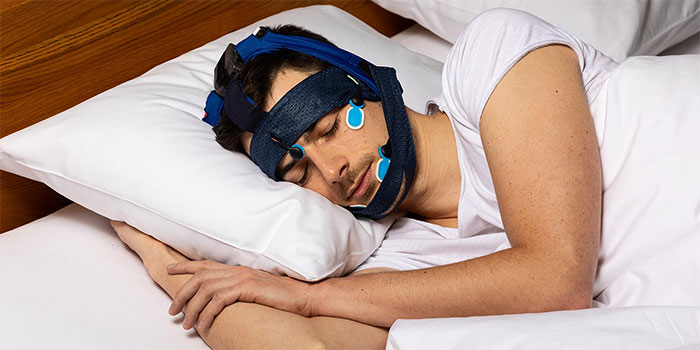Technological devices that support users to sleep deeply
As people age, not only is it difficult to fall asleep, but it also takes longer to fall into a deep sleep state.
The experimental new SleepLoop device is designed to assist users by emitting sounds, making it easier for them to fall asleep.
SleepLoop is currently developed at the Swiss Federal Institute of Technology (ETH Zurich). The device was inspired by previous studies, which concluded that sound played through headphones enhances brain waves known as slow waves. Meanwhile, during deep sleep, eyes and muscles relax, brain waves are slower than other stages of sleep.

The device is capable of continuously monitoring the wearer's electrical brain activity.
Sleep is essential to life. However, in reality, many people face a lack of sleep. Chronic insomnia has been linked to metabolic diseases like diabetes, as well as brain disorders, including Alzheimer's disease.
To date, however, results in producing slow waves have only been achieved in sleep laboratories, under controlled conditions. In contrast, SleepLoop is designed to be used at home, every night (if needed).
The headband part of the device contains the electrodes and a microchip. As a result, it is possible to continuously monitor the wearer's electrical brain activity. As soon as a slow wave is detected, SleepLoop emits an auditory signal. Although this sound was not consciously heard by the wearer, the signal is thought to enhance the slow wave by helping to synchronize the activity of the neurons involved.
In one trial, 16 volunteers aged 62-78 used SleepLoop at home every night for four weeks. The device emits a sleep-promoting signal in just two weeks. However, neither the participants nor the researchers knew which two weeks in advance.
When the recorded data was later analyzed, the scientists found that using SleepLoop did indeed improve slow waves in some of the testers. Meanwhile, this device has little or no effect on others.
Based on these findings, the scientists are trying to establish a method of predicting how well the device will perform on specific individuals. From there, improve the performance of SleepLoop.
SleepLoop is currently commercialized by Spinoff Tosoo Company. A paper on the study, led by Dr. Caroline Lustenberger, was recently published in the journal Communications Medicine.
- Unique Snooze devices help people sleep deeply
- Technologies that help 'comfort' sleep
- Unexpected discovery of the sleeping time of the ancient people
- Sleep controls the time of nature?
- Discover sleep monitoring technology devices
- Smartphone and tablet have a bad effect on sleep
- Detection of genes involved in deep sleep
- Thousands of people with heart disease can be saved by this invention
- Should sleep deeply and fully every night
- The potential of technology equipment can carry
- Adobe Flash software for mobile devices
- How to control your dream?
 'Barefoot engineer' invents a pipeless pump
'Barefoot engineer' invents a pipeless pump Process of handling dead pigs due to disease
Process of handling dead pigs due to disease Radiometer
Radiometer Warp Engine: Technology brings us closer to the speed of light
Warp Engine: Technology brings us closer to the speed of light